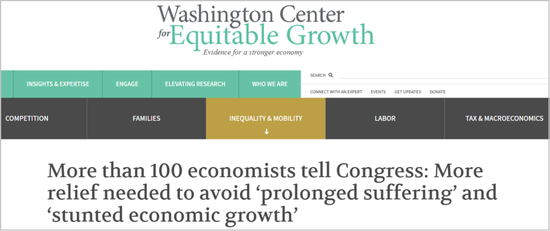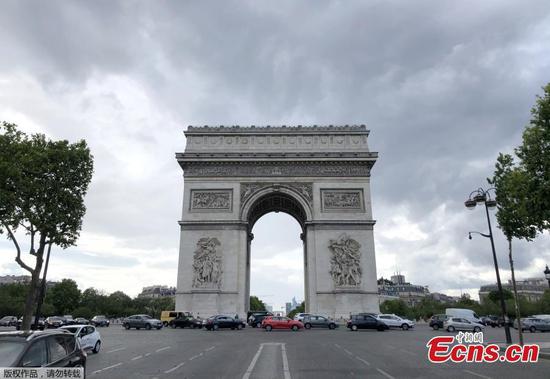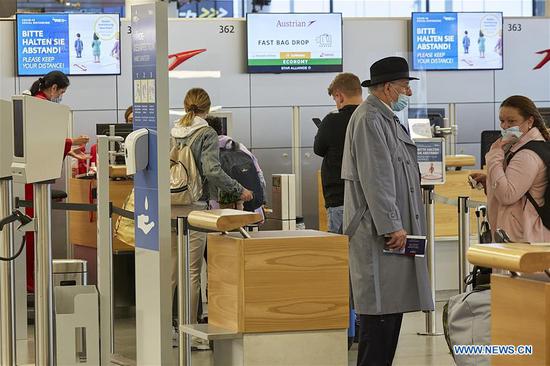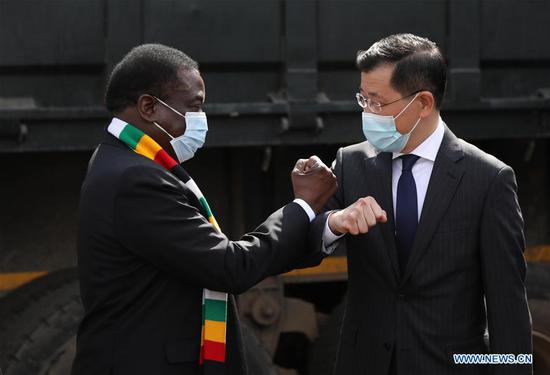
A screenshot taken from equitablegrowth.org on June 16, 2020, shows the name of Washington Center for Equitable Growth and the title of the statement it released, "More than 100 economists tell Congress: More relief needed to avoid 'prolonged suffering' and 'stunted economic growth'." (Xinhua)
More than 100 economists on Tuesday urged U.S. Congress to immediately pass a "multifaceted relief bill of a magnitude commensurate with the challenges our economy faces" as the COVID-19 fallout continues to ripple through the country.
"The novel coronavirus outbreak has unleashed a recession that is unprecedented in the speed and severity of its decline. Since February, 1 in 5 workers has applied for unemployment benefits," the economists said in a statement to congressional leaders released by the Washington Center for Equitable Growth.
"These parallel health and economic crises are especially damaging to many communities of color in the United States. Black, Latinx and Native American families are bearing a greater share of COVID-19 deaths and also face higher rates of unemployment than their White counterparts," the statement said.
While policymakers in Congress and the Federal Reserve responded to this crisis with unprecedented levels of economic support for those affected, more needs to be done, noted the economists, led by former Federal Reserve Chairman Ben Bernanke, Washington Center for Equitable Growth CEO Heather Boushey and Cecilia Rouse, dean of the Woodrow Wilson School of Public and International Affairs at Princeton University.
"If Congress fails to act, state and local governments face potentially disastrous budget shortfalls, and the Congressional Budget Office (CBO) estimates the unemployment rate will likely be more than 11 percent at the end of the year," they warned, adding "insufficiently bold congressional policy responses to the Great Recession" unnecessarily prolonged suffering and stunted economic growth.
The economists urged Congress to pass another COVID-19 relief bill by this summer, which should at least provide "continued support for the unemployed, new assistance to states and localities, investments in programs that preserve the employer-employee relationship, and additional aid to stabilize aggregate demand."
"We all agree that an adequate response must be large, commensurate with the nearly 16 trillion dollar nominal output gap our economy faces over the next decade, according to CBO estimates," said the economists.
The statement is endorsed by more than 100 scholars, including two former chairs of the Federal Reserve, three former chairs of the White House Council of Economic Advisers, and two Nobel laureates, among others.
The U.S. National Bureau of Economic Research (NBER) confirmed last week that the U.S. economy officially entered a recession in February, ending the longest expansion in U.S. history.
"The unprecedented magnitude of the decline in employment and production, and its broad reach across the entire economy, warrants the designation of this episode as a recession, even if it turns out to be briefer than earlier contractions," said the NBER, an association of the nation's top economic researchers.
The U.S. economy contracted at an annual rate of 5 percent in the first quarter this year, according to the Commerce Department. That figure, however, still does not fully capture COVID-19's economic damage, and many analysts believe that the decline in the second quarter is expected to be much deeper.


















































